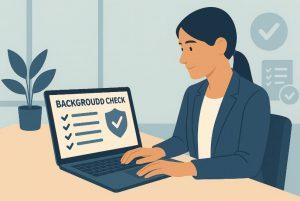The Disclosure and Barring Service (DBS) plays a pivotal role in maintaining public safety in the United Kingdom. It ensures that individuals who may pose a risk to vulnerable populations, such as children or adults in care, are prevented from working in sensitive roles.
For London employers, particularly in healthcare, education, and public service sectors, understanding the DBS is essential for compliant and safe recruitment practices.
The DBS enables organisations to make informed hiring decisions while giving individuals the opportunity to prove their suitability for positions of trust. But how does it work, who needs it, and why is it so crucial to London’s workforce?
What Does the Disclosure and Barring Service Do?

The DBS is a government body responsible for processing criminal record checks and maintaining the barred lists of individuals prohibited from working with vulnerable groups.
Protecting the Public
At its core, the DBS exists to protect the public. By offering employers the ability to verify whether a candidate has a criminal history or is on a barring list, it minimizes the risk of harm to children, elderly individuals, or those with disabilities. This system ensures that organisations in London and across the UK can maintain trust and compliance while protecting the communities they serve.
Supporting Safer Recruitment
Employers, especially in sensitive sectors, rely on the DBS to support safer recruitment decisions. Without it, businesses could unknowingly hire individuals with a history of serious offences, leading to potential harm and legal repercussions.
How Does the DBS Check Process Work in the UK?
The DBS check process is structured to be straightforward, yet thorough, to ensure accuracy in assessing a candidate’s criminal record.
Step 1: Application Submission
A DBS check begins with the application. Depending on the type of check, this may be submitted by the employer or, in the case of a basic DBS, by the individual themselves. Applications can be completed online or through a registered umbrella body.
Step 2: Identity Verification
Applicants must provide official identification documents, such as a passport, driving licence, and proof of address. Employers or umbrella bodies verify these documents before forwarding the application.
Step 3: Criminal Record and Barred List Search
The DBS thoroughly examines police databases to identify any relevant criminal history. For enhanced checks, the DBS also verifies whether the applicant appears on barring lists, which indicate that they are legally prohibited from working with vulnerable populations.
Step 4: Certificate Issuance
After the checks are complete, a DBS certificate is issued to the applicant. This document allows both employers and individuals to confirm whether the applicant is suitable for the role.
Who Needs a DBS Check in London and Across the UK?
DBS checks are mandatory for many roles where public safety and trust are involved.
Healthcare and Medical Roles
Anyone working in hospitals, care homes, or medical clinics often requires an enhanced DBS check. This ensures that patients, particularly the elderly and those with complex needs, are protected from potential harm.
Education and Childcare
Individuals working in schools, including teachers, assistants, nursery carers, and volunteers, must obtain a DBS check before starting their role. These checks are essential in safeguarding children and maintaining parental confidence in educational institutions.
Volunteering and Community Work
Many charities and community organisations in London require volunteers to undergo DBS checks, particularly if they will be interacting with vulnerable individuals or managing confidential information.
By ensuring that only suitable individuals take on these roles, the DBS strengthens public confidence in community services.
What Are the Different Types of DBS Checks?
The DBS offers three levels of checks, each suited for different job responsibilities. Understanding their distinctions is key for employers and applicants alike.
| Type of DBS Check | Eligibility | Information Included | Common Uses | Processing Time | Cost |
| Basic DBS | Any individual or employer | Unspent convictions only | General employment and personal checks | 2–5 working days | £18 |
| Standard DBS | Employer request only | Spent and unspent convictions, cautions, reprimands | Roles in law, finance, and positions of responsibility | 5–10 working days | £18 |
| Enhanced DBS | Employer request only | Full criminal history and local police records; may include barred list checks | Healthcare, education, childcare, and roles involving vulnerable adults | 10–20 working days | £38 |
Why the Enhanced DBS Is Most Common in London?
Due to London’s high population density and diverse employment sectors, enhanced DBS checks are frequently required, especially for teachers, social workers, and medical professionals.
How Can Employers Request a DBS Check?

Employers can initiate DBS checks through registered umbrella bodies or directly if their organisation is DBS-registered.
Employer Responsibilities
Employers must ensure that the role qualifies for the level of DBS check requested. They are also legally required to keep applicant information confidential and use it solely for recruitment decisions.
Modern DBS processes are digital-first, allowing applications to be tracked online, which improves speed and reduces administrative delays.
What Are the Benefits of a DBS Check for Employers and Individuals?
DBS checks provide security and credibility for both sides of the recruitment process.
For Employers
Employers gain assurance that their hiring decisions are legally compliant and that they have done their part to protect vulnerable individuals. This also reduces the risk of liability from negligent hiring claims.
For Individuals
Candidates who receive a clear DBS certificate gain confidence and career opportunities in sensitive sectors. A DBS check can also serve as a personal verification tool, enhancing their professional credibility.
How Long Does a DBS Check Take and How Much Does It Cost?
The processing duration and fees for a DBS check differ according to the type of check being applied for.
- Basic DBS: 2–5 working days, £18.
- Standard DBS: 5–10 working days, £18.
- Enhanced DBS: 10–20 working days, £38.
In some cases, delays can occur if the check requires input from multiple police jurisdictions. Employers and individuals can track applications online to monitor progress.
How Does the DBS Safeguard Vulnerable Groups in the UK?

The barred list system is a critical function of the DBS, helping ensure that unsuitable individuals cannot work in regulated roles.
The Role of the Barred Lists
There are two primary barred lists:
- Children’s Barred List: For individuals prohibited from working with children.
- Adults’ Barred List: Identifies people who are legally restricted from taking roles that involve caring for or supporting vulnerable adults.
Employers are legally required to check these lists before hiring for relevant roles. This legal framework makes the DBS an essential barrier against exploitation and harm.
What Should You Do if a DBS Check Reveals a Criminal Record?
A criminal record does not always mean automatic disqualification.
Fair Recruitment Practices
Employers are advised to evaluate how the offence relates to the responsibilities of the position before making a decision. UK employment law encourages balanced decision making and protection for individuals with spent convictions.
Employers may discuss the results with the candidate and assess whether the conviction impacts their ability to perform the role safely.
Why Is the DBS Essential for Safe Recruitment in London?
London’s vibrant workforce includes thousands of roles that demand trust and accountability. The DBS ensures that employers can hire safely, protecting the city’s most vulnerable populations.
By combining criminal record verification with barring list checks, the DBS has become a cornerstone of modern recruitment, reinforcing public safety and organisational credibility.
What Are the Legal Obligations for Employers Regarding DBS Checks?

Employers in London and across the UK must follow strict legal guidelines when it comes to conducting DBS checks. These regulations ensure that the process is fair, confidential, and compliant with employment law.
Complying With UK Legislation
Under the Rehabilitation of Offenders Act 1974, employers are only permitted to request DBS checks when a role is eligible. Conducting a DBS check for an ineligible position could violate privacy rights and result in legal repercussions.
Data Protection Responsibilities
DBS certificates contain sensitive personal information, and employers must store and handle this data securely. They cannot share the certificate publicly or discriminate unlawfully against applicants with spent convictions unless the convictions are relevant to the role.
Duty to Refer
Employers also have a duty to refer individuals to the DBS if they are dismissed or removed from a role for posing a risk to vulnerable groups. This step ensures that future employers are protected.
How Has the DBS Changed Recruitment Practices in London?
Over the years, the introduction and evolution of the DBS system have transformed the hiring landscape in London.
Promoting Safer Hiring Decisions
Employers can now screen candidates with greater confidence, particularly in sectors where safeguarding is paramount. This has reduced incidents of harm and improved public trust in local institutions.
Increased Public Confidence
Parents, patients, and vulnerable individuals rely on organisations to hire responsibly. Knowing that employees have passed DBS checks reassures the public that safety is a priority.
Efficiency Through Digital Processes
Switching to online DBS applications has simplified the recruitment process in London, shortening delays and allowing qualified candidates to begin work sooner.
What Future Developments Are Expected for the DBS?

As London and the UK continue to modernise recruitment practices, the DBS is also evolving to meet new demands.
Digital Transformation
Future DBS processes are likely to become fully digital, with instant verification options for employers and individuals. This advancement is expected to speed up processing even more while making the system easier to use.
Enhanced Data Security
With the rise of cybersecurity threats, the DBS is expected to implement advanced encryption and secure verification systems, safeguarding sensitive applicant data more effectively.
Integration With Wider Safeguarding Systems
In the future, the DBS may integrate more closely with local authorities and safeguarding databases, providing real-time alerts for employers if a staff member’s eligibility status changes.
Conclusion
Across the UK, the Disclosure and Barring Service (DBS) plays a vital role in safeguarding the public and ensuring secure hiring practices. By verifying criminal records and maintaining barred lists, it ensures that vulnerable groups remain safeguarded and that employers can hire with confidence and compliance. In London’s fast-paced workforce, the DBS remains a cornerstone of trust and safety.
Resource:
FAQs
What documents are required for a DBS check?
Applicants must provide proof of identity and address, such as a passport, driving licence, and utility bill.
Can self-employed professionals apply for a DBS check?
Yes, self-employed individuals can apply for a basic DBS check directly, or obtain an enhanced check through an agency if their role requires it.
How often should a DBS check be renewed?
There is no legal requirement, but many organisations renew checks every 1–3 years for safety.
Why might a DBS check be delayed?
Delays often occur if the application involves multiple police forces or additional verification.
Can DBS results be appealed?
Yes, individuals can appeal if errors appear on their DBS certificate or request a formal review.
Do spent convictions appear on DBS checks?
Basic DBS checks show only unspent convictions, while standard and enhanced checks may display spent convictions unless filtered.
Are DBS checks free for volunteers?
Volunteers can access enhanced DBS checks at no cost, although certain organisations might request a minor fee to cover administrative processing.









Leave feedback about this